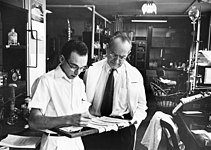Irvine Page, Date of Birth, Place of Birth, Date of Death
TweetIrvine Page
American physiologist
 Date of Birth: 07-Jan-1901
Date of Birth: 07-Jan-1901
 Place of Birth: Indianapolis, Indiana, United States
Place of Birth: Indianapolis, Indiana, United States
Date of Death: 10-Jun-1991
Profession: physiologist
Nationality: United States
Zodiac Sign: Capricorn 
About Irvine Page
- Irvine Heinly Page (January 7, 1901 – June 10, 1991) was born in Indianapolis, Indiana and was an American physiologist who played an important part in the field of hypertension for almost 60 years while working at the Cleveland Clinic as the first Chair of Research.His first contributions were published in the early 1930s and his most recent, "Hypertension Research: A Memoir : 1920–1960", in 1988.
- He is perhaps best known for the co-discovery of serotonin in 1948, although his pre-eminence is a matter of record in four other areas: the renin–angiotensin system, the mosaic theory of hypertension, treatment of hypertension and public and professional advocacy of the recognition of this condition and its effects in daily life.
- In earlier work he published on the neurochemistry of the brain. Page received many honors for his work.
- He was on the cover of Time magazine in 1955.
- He was president of the American Heart Association (1956–57); he received ten honorary degrees and a number of prestigious awards—the Ida B.
- Gould Memorial Award of the American Association for the Advancement of Science (1957); Albert Lasker Award (1958); Gairdner Foundation International Award (1963); Distinguished Award of the American Medical Association (1964); Oscar B.
- Hunter Award (1966); Passano Foundation Award (1967); and the Stouffer Prize (now the Novartis Award) for Hypertension Research in 1970.
- He was elected to the National Academy of Sciences in 1971 and published his memoirs in 1988. The American Heart Association Irvine H.
- Page Young Investigator Research Award and the Irvine Page – Alva Bradley Lifetime Achievement Award are named in his honor. A collection of his papers is held at the National Library of Medicine in Bethesda, Maryland.
Read more at Wikipedia

